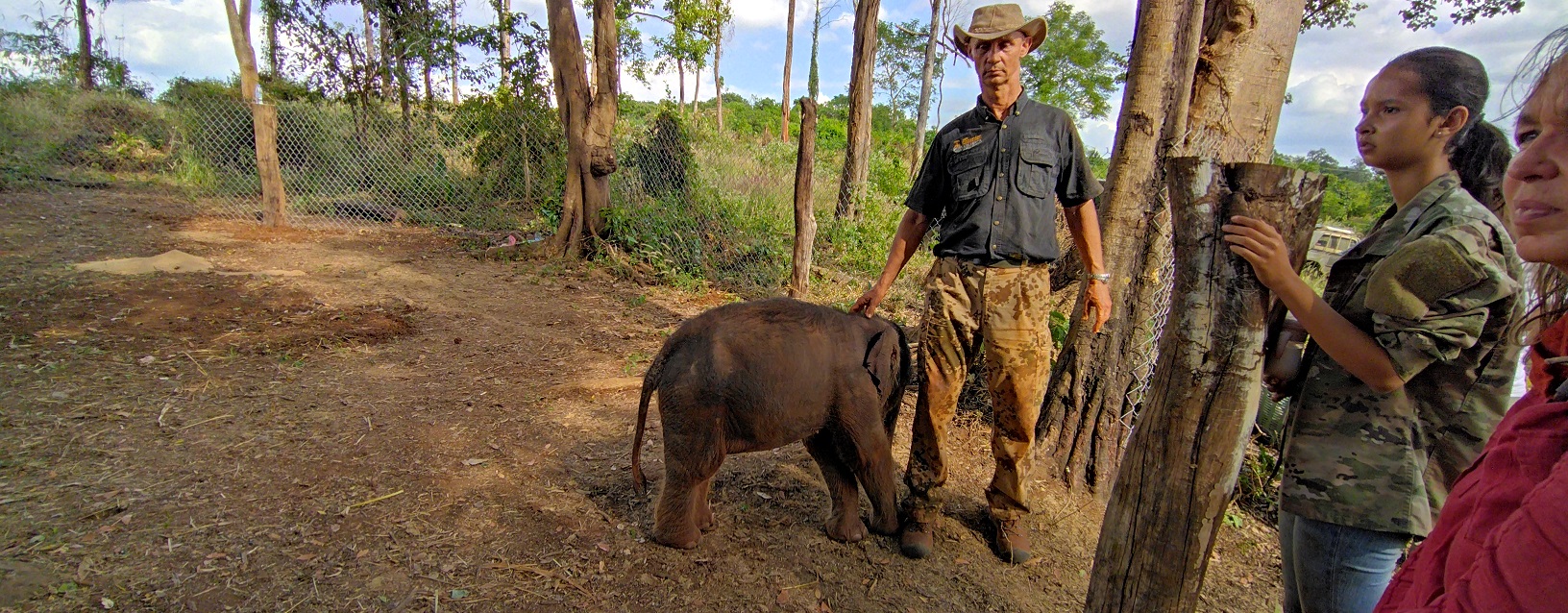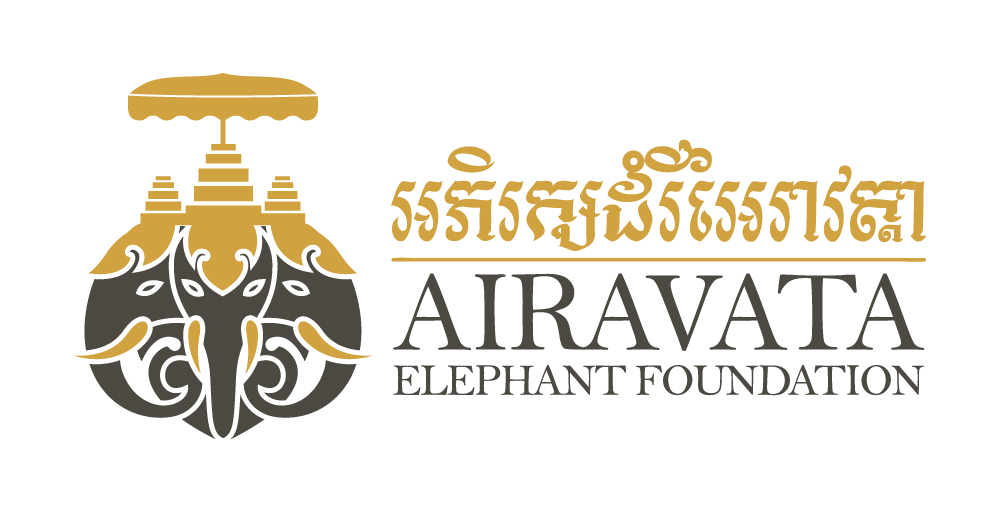
Our Programs
Half a day with Noëlle
Noëlle’s morning program
Small trip towards the South of Banlung trough fields and rubber plantations. 70% road, 30% dirt track.
Arrival at the camp site at 9AM.
Presentation of Aïravata, of the place and our philosophy.
We go to the corral, observe the care and training of the male elephants (power washing, health check, positive reinforcement, etc).
This done we greet mother and daughter and give treats while listening to the story of Ikeo and of her unlikely pregnancy.
We hose Ikeo, brush her nails with shampoo and do a health check.
We check Noëlle’s weight while giving her a milk bottle to get on the scale.
All this done, we take mother and daughter to forage for food into the Katieng forest, roughly a 1 hour / 1 hour 30 walk on uneven terrain. Of course we shall adapt the level of difficulty according to the fitness of the guests. It is elephant school for Noëlle as by observing her mother and mimicking her, she learns what plants to eat or not to eat.
Noëlle’s afternoon program
Small trip towards the South of Banlung trough fields and rubber plantations. 70% road, 30% dirt track.
Arrival at the camp site at 2.30PM.
Presentation of Aïravata, of the place and our philosophy.
We go to the corral, observe the care and training of the male elephants (power washing, health check, positive reinforcement, etc).
This done we greet mother and daughter and give treats while listening to the story of Ikeo and of her unlikely pregnancy.
We hose Ikeo, brush her nails with shampoo and do a health check.
We check Noëlle’s weight while giving her a milk bottle to get on the scale.
All this done, we go for an elephant ride to the Katieng waterfall, it is roughly a 1 hour 30 ride through clearings and some beautiful forest. It is possible to swim in the waterfall.
We ride back to the camp and give treats to the elephants before leaving.

A full Day with Noëlle
Small trip towards the South of Banlung trough fields and rubber plantations. 70% road, 30% dirt track.
Arrival at the Aïravata site at 9 AM
Small trip towards the South of Banlung trough fields and rubber plantations. 50% road, 50% dirt track.
Arrival at the camp site at 9AM.
Presentation of Aïravata, of the place and our philosophy.
We go to the corral, observe the care and training of the male elephants (power washing, health check, positive reinforcement, etc).
This done we greet mother and daughter and give treats while listening to the story of Ikeo and of her unlikely pregnancy.
We hose Ikeo, brush her nails with shampoo and do a health check.
We check Noëlle’s weight while giving her a milk bottle to get on the scale.
All this done, we take mother and daughter to forage for food into the Katieng forest, roughly a 1 hour / 1 hour 30 walk on uneven terrain. Of course we shall adapt the level of difficulty according to the fitness of the guests. It is elephant school for Noëlle as by observing her mother and mimicking her, she learns what plants to eat or not to eat.
We then go back to the camp for a bath in the river with the elephants.
Lunch and rest until 2.30pm then we go for an elephant ride to the Katieng waterfall, it is roughly a 1 hour 30 ride through clearings and some beautiful forest. It is possible to swim in the waterfall.
We ride back to the camp and give treats to the elephants before leaving.

Elephant “Spa”
Small trip towards the South of Banlung trough fields and rubber plantations. 70% road, 30% dirt track.
Arrival at Airavata’s camp, introduction to the elephants and their mahouts before going down to the river to wash and scrub the elephants then give them a treat of fruits.
Total duration of the tour, from Banlung and back, about 3 hours and a half.

Elephant Ride
Small trip towards the South of Banlung trough fields and rubber plantations. 70% road, 30% dirt track.
Arrival at Airavata’s camp, introduction to the elephants and their mahouts before getting in the saddle for about 1h30 to the discovery of the nearby forest.
Total duration of the tour, from Banlung and back, about 3 hours and a half.

Elephant “Mahout for a day”
Small trip towards the South of Banlung trough fields and rubber plantations. 70% road, 30% dirt track. Arrival at the site at 9am.
Presentation of Aïravata, the site and our philosophy.
We go to the corral and watch the elephants being cared for and trained (washing, health checks, positive reinforcement, etc).
We then welcome mother and daughter and give them treats while listening to the story of Ikeo and her unlikely pregnancy.
We wash Ikeo, brush her nails with shampoo and give her a health check, then check Noëlle’s weight by giving her a bottle of milk to get her on the scales.
We then learn the rudiments of elephant riding and take a short test ride near the camp.
Lunch and rest until 2.30pm, then we take a long walk in the forest in the afternoon to master what we’ve learned in the morning. The walk lasts around 1 hour 30 minutes and passes through clearings and a magnificent forest. There’s a chance to swim in the waterfall. On the way back, we wash our friends in the little river nearby and reward them with treats before leaving.
The tour lasts around 7 hours.

Khmer Traditional Weddings
Restoring the elephant to its rightful place in Cambodian society is one of Aïravata’s main objectives! It is now possible to organise a wedding in the purest Khmer tradition, with elephants!
To do this, of course, you need to come to Ratanakiri, where the Airavata and Terres Rouges teams will join forces to ensure that the most beautiful day of your life is blessed by the greatest animal on earth.

To ride or not to ride an elephant ?
Some people think that being a wild animal the elephant shouldn’t be ridden, they think it is cruel and physically damages the animal.
We believe that only abuse is bad, making elephants carry heavy loads for long hours is bad, this is not what we do.
We can’t help but notice that the champions of the elephants’ rights do not seem to care so much about the fate of the horse which was not born to carry people on its back but still does it everyday with loads that are much heavier in comparison to its size…
Our elephants were already tame when we acquired them, they can’t live in the wild any more, they are not afraid of man and if we set them free they would destroy people’s crops and houses and be killed for that.
Ours is a pragmatic approach but it is also a cultural one, the link between man and the elephant has existed for five thousand years and is an integral part of Khmer Culture.
We continue this tradition.

What to wear and bring with you ?
Clothes that do not show dirt (like army fatigues for instance) and thick enough as elephant hairs can prick, two pairs of shoes or at least one that can go in the water.
Maybe a pair of shorts or a swimming trunks for the elephant bath.
Some mosquito repellent, sunscreen, a hat and a raincoat during the rainy season.
